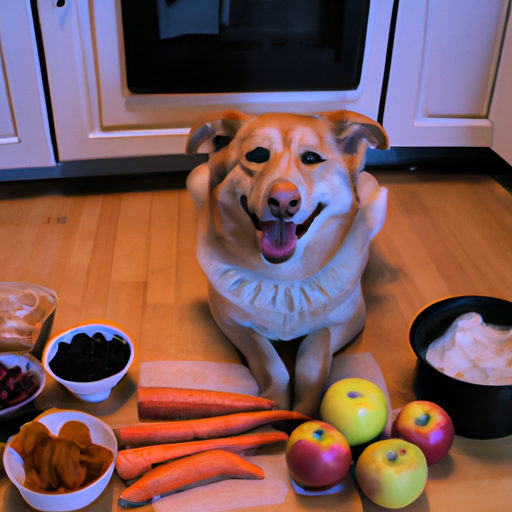As a loving and responsible pet owner, you often find yourself wondering about your dog’s diet. Just like us humans, our four-legged friends also enjoy a little variety in their meal. However, not all human foods are safe for dogs. In this comprehensive guide, we’ll explore the human foods that dogs can eat safely.
1. Peanut Butter
Peanut butter is a tasty treat that many dogs love. It’s packed with protein, healthy fats, niacin, vitamin B, and vitamin E. However, it’s crucial to ensure that the peanut butter you offer your dog is free from xylitol, a sweetener that can be harmful to dogs.
- Safe consumption: In moderation, as an occasional treat.
- Preparation: Raw or cooked, but always unsalted and without additives.
2. Chicken
Chicken is a great source of protein for dogs, and it’s often found in commercial dog food. However, make sure any chicken you feed your dog is cooked thoroughly and free from bones.
- Safe consumption: Regularly, as part of a balanced diet.
- Preparation: Cooked, without seasoning or bones.
3. Carrots
Carrots are low in calories and high in fiber and vitamins. They make an excellent snack for your dog. Chewing on raw carrots can also be good for your dog’s teeth.
- Safe consumption: Regularly, as a treat or meal addition.
- Preparation: Raw or cooked, but always peeled and chopped into bite-sized pieces.
4. Apples
Apples are a good source of fiber and vitamins A and C. However, always remove the core and seeds before giving an apple to your dog, as they can be choking hazards.
- Safe consumption: Occasionally, as a sweet treat.
- Preparation: Peeled and sliced, with the core and seeds removed.
5. Rice and Pasta
Rice and pasta are easily digestible and good for dogs who are feeling under the weather. They should be served plain and are a great way to bulk up meals in a healthy way.
- Safe consumption: Occasionally, as part of a balanced diet.
- Preparation: Cooked and unseasoned.
6. Fish
Fish such as salmon and tuna are rich in omega-3 fatty acids, which can boost your dog’s immune system and support a shiny, healthy coat. However, always ensure the fish is cooked and has no bones.
- Safe consumption: Occasionally, as a rich treat or meal addition.
- Preparation: Cooked and deboned.
7. Blueberries
Blueberries are a superfood packed with antioxidants and fiber. They make a refreshing, healthy treat for your dog, especially on hot summer days.
- Safe consumption: Occasionally, as a sweet treat.
- Preparation: Raw, washed, and whole.
8. Green Beans
Green beans are low in calories and high in iron and vitamins, making them a healthy snack for your dog. Ensure they’re plain and free from any seasoning or added salt.
- Safe consumption: Regularly, as a treat or meal addition.
- Preparation: Cooked or raw, but always unseasoned.
| Food | Safe Consumption | Preparation |
|---|---|---|
| Peanut Butter | In moderation | Unsweetened, no additives |
| Chicken | Regularly | Cooked, no bones |
| Carrots | Regularly | Peeled, bite-sized |
| Apples | Occasionally | Peeled, cored |
| Rice and Pasta | Occasionally | Cooked, unseasoned |
| Fish | Occasionally | Cooked, deboned |
| Blueberries | Occasionally | Raw, whole |
| Green Beans | Regularly | Unseasoned |
FAQs
Can dogs eat all fruits and vegetables?
Not all fruits and vegetables are safe for dogs. For example, grapes, raisins, onions, and garlic are toxic to dogs.
Can dogs eat dairy products?
Some dogs can tolerate dairy products, while others may experience digestive upset. It’s best to give dairy in small amounts and see how your dog reacts.
Can dogs eat nuts?
Some nuts, like almonds and walnuts, can be harmful to dogs. However, peanuts are safe for dogs to consume. Always ensure nuts are unsalted and given in moderation.
Are eggs safe for dogs?
Yes, eggs are safe for dogs to eat. They are a great source of protein. However, they should be fully cooked, as raw eggs can carry risk of salmonella.
Remember, every dog is unique, and what works for one might not work for another. Always introduce new foods gradually and observe for any adverse reactions. When in doubt, consult with your vet.



